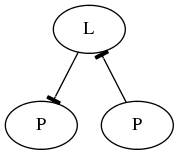 Probabilistic logic programming 2017
Probabilistic logic programming 2017

 Probabilistic logic programming 2017
Probabilistic logic programming 2017

An ILP workshop
Orléans, France - 7 September 2017
Deadline: March 7, 2018 EXTENDED to Aptil 7, 2018 (Papers will be sent to reviewers as soon as we receive them).
Publication of the special issue: January 2019 (tentative).
| 9:30-10:30 | Invited talk: Inference for Probabilistic Logic Programming with Continuous Distributions. Arjen Hommersom |
| 10:30-11:00 | Coffee break |
| 11:00-11:30 | Arnaud Nguembang Fadja, Evelina Lamma and Fabrizio Riguzzi. Deep Probabilistic Logic Programming |
| 11:30-12:00 | Anthony Di Franco. Information-gain computation |
| 12:00-14:00 | Lunch break |
| 14:00-15:00 | Invited talk: PRISM revisited: declarative implementation of a probabilistic programming language using delimited control. Samer Abdallah |
| 15:00-15:30 | Alexander Vandenbroucke and Tom Schrijvers. From PRISM to ProbLog and Back Again |
| 15:00-15:30 | Marco Alberti, Evelina Lamma, Fabrizio Riguzzi and Riccardo Zese. A Distribution Semantics for non-DL-Safe Probabilistic Hybrid Knowledge Bases |
| 15:30-16:30 | Discussion |
The proceedings can be found at CEUR.
Probabilistic logic programming (PLP) approaches have received much attention in this century. They address the need to reason about relational domains under uncertainty arising in a variety of application domains, such as bioinformatics, the semantic web, robotics, and many more. Developments in PLP include new languages that combine logic programming with probability theory as well as algorithms that operate over programs in these formalisms.
PLP is part of a wider current interest in probabilistic programming. By promoting probabilities as explicit programming constructs, inference, parameter estimation and learning algorithms can be run over programs which represent highly structured probability spaces. Due to logic programming's strong theoretical underpinnings, PLP is one of the more disciplined areas of probabilistic programming. It builds upon and benefits from the large body of existing work in logic programming, both in semantics and implementation, but also presents new challenges to the field. PLP reasoning often requires the evaluation of large number of possible states before any answers can be produced thus breaking the sequential search model of traditional logic programs.
While PLP has already contributed a number of formalisms, systems and well understood and established results in: parameter estimation, tabling, marginal probabilities and Bayesian learning, many questions remain open in this exciting, expanding field in the intersection of AI, machine learning and statistics.
This workshop aims to bring together researchers in all aspects of probabilistic logic programming, including theoretical work, system implementations and applications. Interactions between theoretical and applied minded researchers are encouraged. The presence of this workshop at ILP is intended to encourage collaboration with researchers from the field of Inductive Logic Programming.
The workshop will take place at LIFO, Laboratoire d'Informatique Fondamentale d'Orlèans. How to reach us is described here.
The fee for participating in PLP'17 is 40€, which includes coffee breaks and lunch. The registration for PLP'17 is managed through the ILP registration system. To register, visit ILP registration page.
Registration: from 1 May 2017 to 6 September 2017
Probabilistic logics combine the expressive power of logic with the ability to reason with uncertainty. Given the discrete nature of logical languages, it is natural to use these languages for modelling discrete distributions. However, for many practical applications, both discrete and continuous distributions are required. In this talk, I will discuss several approaches for dealing with continuous distributions as part of a PLP language. Furthermore, I will discuss in more detail our recent PLP approach for dealing with continuous distributions by means of probability intervals. In particular, the Interative Hybrid Probabilistic Model Counting (IHPMC) algorithm will be discussed, which enables approximating a large class of hybrid problems with a bounded error. It has been shown that the current implementation can outperform current sampling implementation, in particular when the programs contain sufficient logical structure.
PRISM is a probabilistic programming language based on Prolog augmented with primitives to
represent probabilistic choice. PRISM is implemented using a combination of low
level support from a modified version of B-Prolog, source level program transformation, and
libraries for probabilistic inference and learning implemented in the imperative language C.
More recently, developers of probabilistic languages working in the functional programming
paradigm have taken the approach of embedding probabilistic primitives into an existing
language, with little or no modification to the host language, primarily by using continuations:
captured continuations represent pieces of the probabilistic program which can be manipulated to
achieve a great variety of computational effects.
In this talk, I will describe an approach based on delimited control operators recently introduced
into SWI Prolog. These are used to create a system of nested effect handlers which together
implement a core functionality of PRISM -the building of explanation graphs- entirely in Prolog
and using an order of magnitude less code. In addition, other declarative programming tools, such
as constraint logic programming, are used to implement several tools for inference, such as the
inside-outside and EM algorithms, lazy best-first explanation search, and MCMC samplers.
By embedding the functionality of PRISM into SWI Prolog, users gain access to its rich libraries and
development environment. By expressing the functionality of PRISM in a relatively small amount of
pure, high-level Prolog, this implementation will hopefully facilitate further experimentation with the
mechanisms of probabilistic logic programming and extensions to new modelling features.
| Papers due: | Sun, |
| Notification to authors: | Tue, 11th July 2017 |
| Camera ready version due: | Tue, 25th July 2017 |
| Registration deadline: | Wed, 6th September 2017 |
| Workshop date: | Thu, 7th September 2017 |
(the deadline for all dates is 23:59 BST)
Full papers: 6-12 pages, short communications 2-5 pages.
Submissions site: easychair.
Call for papers: txt.